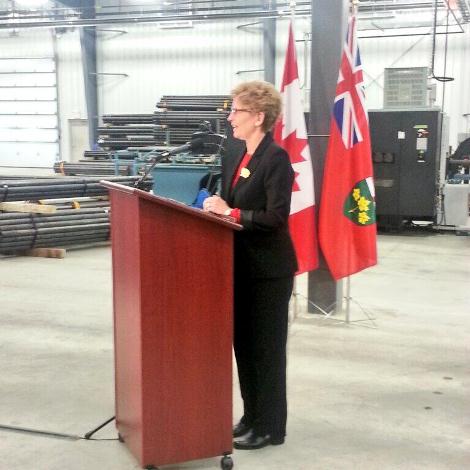 Ontario Premier Kathleen Wynne addresses the media at Drillers Edge Wednesday. Photo by Mark Pare.
Ontario Premier Kathleen Wynne addresses the media at Drillers Edge Wednesday. Photo by Mark Pare.
Ontario Premier Kathleen Wynne was in North Bay on Wednesday, at a business on Voodoo Crescent, which is a part of North Bay's newest industrial park, adjacent to the Jack Garland Airport.
She was there to announce that Drillers Edge, a manufacturer of core drilling tools, is to receive $600,000 of government funding to help mineral exploration thrive within the North.
Although she was there to announce the funding, a long awaited media scrum resulted in questions being asked regarding the many issues that are currently affecting those who live in the North, such as the ongoing ONTC divestiture and the sudden halt of mining development at the Ring of Fire.
Wynne spoke to reporters open about these issues, saying that progress is being made with regards to the Ring of Fire and the ONTC but that things are happening from behind the scenes and moving forward.
She says that the Ontario Government had heard what municipalities are concerned about and is trying to bring the North together to discuss the impact that the closure of the ONTC's transportation and infrastructure network will have on Northern Ontario.
“Al McDonald was one of the mayors who said 'there needs to be a local advisory committee, there needs to be more input from the communities that will be affected by decisions of the ONTC,” says Wynne.
Wynne promised to find different solutions for each of the different parts within the ONTC that best suits each branch of the provincial asset.
“I am determined to find the right answer,” she says.
She says that having the ONTC together as a whole is not the only option and that the Province is looking at re-visioning the corporation.
“There are discussions going on with each part,” says Wynne.
Wynne says that the entire divestiture of the organization is not what Ontario wants and that the goal now is to bring in a more rational process, with the Minister of Northern Development and Mines Michael Gravelle ready to negotiate with affected communities in a very different way.
She also spoke to the issues surrounding the Ring of Fire and the importance of infrastructure and development projects having the proper footing to get started within the North, saying it was critical to get to the resources and opening up that resource industry in the province.
The Premier says that, in her discussions with Canadian Prime Minister Steven Harper, the Federal Government has expressed interest in getting the development started so that the infrastructure is ready to start bringing Ontario's natural resources to an international marketplace.
“He (Harper) is open to doing that and understands that the infrastructure is critical,” Wynne says.
Wynne also says that there is training and initiatives so that First Nation communities can be heard and take part in the development of the Ring of Fire, with talks that are underway so that all of the local communities can benefit from this large long term development.
“If we don't find a way to work with First Nation communities to ensure that everyone who is affected by that potentially $60 billion dollar development, then we're not going to be able to develop, “says Wynne.
She pointed out that not just one company is set to benefit from the potential to expand the mining of Chromium, but that small companies also stand to gain.
She says that the Ontario Government has been working very hard on the project and is committed to doing it, however, they are committed to doing in a way that includes the communities and the municipalities while building infrastructure and creating economic development.
Wynne maintains that it’s critical that everyone involved in the Ring of Fire not overlook potential environmental impacts and make sure that the development of the area is done in a way that is best suited to the long term health of the environment ecosystems that it will affect.
She says that the government has made a commitment to getting the project right to make the least amount of environmental impact while still acknowledging there are going to be challenges with any resource extraction project, particularly one of this scale.
“I want, as a government, to make sure that we get all of those environmental issues dealt with, that we understand as we go along, what those environmental issues are, we understand what those relationship issues are, vis-a-vis First Nations, so that we can actually do our best because unfortunately, there will be environmental concerns,” says Wynne.
When was asked what her solutions were with regards to Northern Ontario soaring hydro rates, which are driving companies and residents from the area, Wynne says that her Ontario government is working with business and residents to keep rates down and competitive and plan to continue to do so.
She said that there are a number of programs that have been put into place, such as the Northern Industrial Electricity Rates Program and the Ontario Energy Tax Credit Program, and says that the provincial government is aware of the issue.
"We will work to make sure that we keep those programs into place, “says Wynne.
Lastly, the Premier pointed to the importance of having good infrastructure and reliable transportation to keep the network open, allowing business to develop in the North and in supporting the extraction of resources as well as refining those resources into market goods in the Ontario communities located near the raw material.
She says that this is the way that you draw people to the North and keep them here.
“Good transportation infrastructure is fundamental to the North,” she says.


